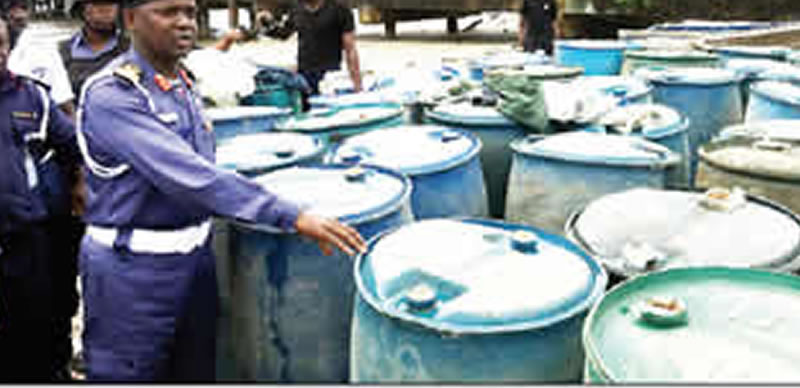
By Emmanuel Addeh:
A report by Proshare, a market intelligence and data analytics firm, has said that oil theft persists in Nigeria because all the institutions of state lack the will and determination to end the menace.
In the report which dived deep into the magnitude of crude oil theft in Nigeria, the firm stated that the ‘business’ has become the soft underbelly of Nigeria’s economic cash cow.
“Nigeria’s oil sector has seen turbo-thievery in recent years as state institutions have lacked the will and determination to address the problem frontally. Oil thieves have become increasingly daring, sophisticated, and prosperous.
“ The financial power of the oil thieves has reinforced their sophistication and encouraged them to morph from pussy cats into lions. Redemption of the sector will require the federal government to be intolerant of crude oil theft and determined to stop it, including placing surveillance over its personnel and adopting top-of-the range technology to monitor the network of domestic onshore pipelines,” it noted.
The report observed that making a comparison between the actual gross earnings from oil and the estimated value of stolen oil, for instance, N1.03 trillion, up to 54 per cent of actual gross oil revenue earned in the first half of 2021, was lost to crude oil thieves. “This marks a notable deterioration compared to previous years,” it said.
In 2017 with an average crude oil price of $54.3/barrel, Nigeria, it said, lost an estimated N1.56 trillion, an equivalent of 38.2 per cent of actual gross oil revenue of N1.89 trillion.
“Except for 2020, when average crude oil prices tanked to $42/barrel, lost revenue on account of crude oil theft has continued to increase,” the report stated, stressing that “there are no garlands for efforts, only results.”
The report noted that the government must be purpose-driven and result-oriented to reduce revenue leakages from the activities of oil thieves and improve the country’s debt-to-revenue ratio. The report writers noted that hard work towards eliminating crude oil theft was not an option but the only game in town.
“Nigeria needs to improve its fiscal revenue, and one relatively quick fix would be to block the revenue leakages caused by pipeline vandals and oil pirates. To win the peace, the government may first need to wage war,” the market intelligence firm explained.
In its executive summary of the report titled: “Anatomy of Crude Oil Theft in Nigeria: Understanding the Graft, Impact and Implications”, it also reviewed some feasible alternatives to resolve the industry challenges.
The report noted that the pricing economics of the oil business must be suitable to avoid theft and diversion of crude oil. It recommended that a market-oriented perspective of the sector should be adopted.
The report’s authors argued that the sectorial governance of the industry should prioritise price discovery through a market mechanism that ensures efficiency, effectiveness, and equity. It also concludes that the concept of a blue economy is a national economic strategy whose time has come.
Crude oil theft in Nigeria’s Delta area, it argued, is not the casual roguery of a ragtag band of militants but a well-structured and coordinated criminal enterprise.
The enterprise, it maintained, comprises a network of highly placed individuals from different walks of life, from the military to politics, commerce, and banking.
“ The players are entrenched, ruthless, and unforgiving. The oil vandals’ vast connections and deep pockets make them formidable and explain the difficulty in dislodging them.
“The prominent role of non-state actors in crude oil market disruption will not be ended by the finer points of fiscal economics alone; it would require the political firmness and commitment of the federal government to take on the illegal local oil cartels.
“Unfortunately, this outcome is far-fetched. Oil pirates and their political associates are pod partners. Rich oil vandals support the funding of election campaigns of politicians who would be remiss in supporting any decisive government action that would adversely affect the interests of their electoral piggy banks.
“The complex relationship between politicians, illegal oil bunkers, and local oil communities makes a firm resolution of the problem more improbable than impossible,” it said.










